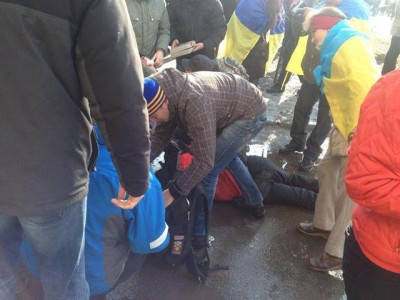PHOTO: Aftermath of explosion at a peace march in Kharkiv on Sunday
Stefan Wolff of the University of Birmingham and Tatyana Malyarenko of Donetsk State Management University write for The Conversation:
Just as the latest peace deal to stabilise Ukraine was being put into place, a bomb exploded in the city of Kharkiv, killing two people and injuring at least ten, while another was found and defused in Odessa.
The secret service of Ukraine soon announced that four people suspected of the Kharkiv attack had been captured; it said they were Russian-trained and had used Russian-made equipment.
When the second Minsk agreement was reached, the leaders involved were obviously relieved that a consensus had proved possible at all. But they were also visibly unsure whether the agreement could really pave the way for lasting peace in the country.
Now, as its provisions at last began to be implemented in earnest, the Kharkiv and Odessa incidents have shown that their barely disguised pessimism in Minsk is still justified.
A Ceasefire’s Slow Steps
Both sides have generally been slow to implement the agreement’s military and security provisions. The withdrawal of heavy weapons from the front lines has been patchy at best and prisoner and hostage exchanges have only just begun.
The ceasefire was formally announced and largely observed, as confirmed by OSCE observers and by leaders in both Moscow and Western capitals, but it has been threatened by continued fighting at strategically significant hotspots. Rebels refused to give up until they had captured Debaltseve, one of three major railway junctions in eastern Ukraine.
On the northern border of the rebel-held areas in the Luhansk region and the southern border of its Donetsk equivalent, Ukrainian troops have been trying to break through rebel lines in order to reach the state border of Ukraine with Russia.
Now, having secured Debaltseve, it appears that the Russian-backed separatists may simply turn their efforts to the strategically crucial port city of Mariupol. The explosion in the hitherto relatively conflict-free city of Kharkiv, meanwhile, may indicate another possible new front in the war. The same applies to the Odessa incident.
As another round of high-level talks took place on February 19, Ukrainian efforts to establish a UN peacekeeping mission were predictably blocked by Russia.
That Ukraine has appealed to the UN for help is of course an admission of weakness, acknowledging that Ukraine alone cannot stem the advances of rebel forces – but it also indicates that Kiev’s commitment to Minsk II is very real. Russia’s blocking response, on the other hand, indicates the opposite – confidence in its superior military capabilities and dissatisfaction with the status quo that Minsk II would freeze in place if properly implemented.
Can An Agreement Be Recovered?
The agreement is under serious threat, but it is not beyond recovery. To succeed on Russian terms, all that needs to happen is for Moscow’s proxy forces to secure the territory deemed strategically important and defensible against any future Ukrainian counter-offensive.
It seems that this point has been reached, at least temporarily, over the weekend. Events in Kharkiv and Odessa aside, there has been a general reduction in violence, weapons withdrawals have at last begun in earnest, the first prisoner exchanges have happened, and another round of talks among the Ukrainian, Russian, German and French foreign ministers is scheduled for February 23 in Paris.
But these talks are likely to be highly acrimonious; expect mutual accusations from Russia and Ukraine and threats of additional sanctions from Germany and France, as well as the US. A sharp flavour of frustration and impotence pervades the rhetoric coming out of Kiev and Western capitals – for all the negotiations in Minsk and elsewhere, for all the sanctions already imposed and threatened, Putin has still been able to do more or less whatever he wants, and with impunity. And it does not look like the West has a viable strategy to really change the situation any time soon.
What only a few short weeks ago looked like a worst-case scenario – another frozen conflict in the (not so) post-Soviet space – would now be a significant improvement on the status quo, and is something everyone seems prepared to settle for in the short term.
But given the military advantages that Moscow and its proxies enjoy on the ground, it may yet take more local battles and plenty of suffering before the Kremlin is content to see the situation frozen permanently.

